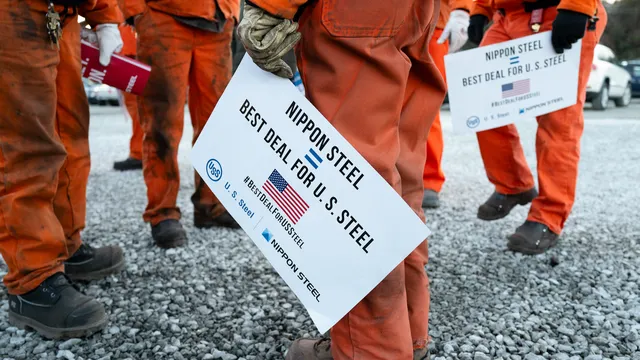
Nippon and US Steel fight Biden in court over $15 billion deal cancellation
2025-01-06 16:54- U.S. Steel and Nippon Steel filed a lawsuit against the Biden administration for blocking their $15 billion merger.
- They accused the government of a corrupt review process influenced by union interests, particularly the United Steelworkers.
- This legal action underscores the complexities of national security regulations in foreign investments in American industries.
Express your sentiment!
Insights
In late December 2024, the U.S. government blocked a $15 billion merger between Nippon Steel and U.S. Steel on national security grounds. This unprecedented action against an ally sparked significant backlash from both steel companies, who labeled the review process as a 'sham.' They filed a lawsuit against the Biden administration, alleging that the president’s intervention was politically motivated and aimed at appeasing the United Steelworkers union, which opposed the merger. The companies contend that this blockage undermines the integrity of U.S. steelmaking and accuse the rival bidder Cleveland-Cliffs of engaging in illegal tactics to thwart their merger plans. The lawsuit claims that Biden, alongside the Committee on Foreign Investment in the United States (CFIUS), compromised the integrity of the review to follow a personal agenda rather than the stipulated national security concerns. Despite Biden's stated commitment to protecting American steel jobs, the steel companies argue that his motives were influenced by union pressures, especially since they had opted for Nippon’s higher offer over Cleveland-Cliffs' bid. This situation marks a significant instance of government intervention in foreign investments related to critical American industries, raising questions about the transparency of the review processes. The United Steelworkers union's opposition is rooted in concerns about Nippon Steel's trade history, which they claimed includes practices that harmed the domestic steel market, such as dumping products. The union supported the merger’s blockage, asserting that its primary focus is the long-term stability of jobs in American facilities. As a result of this legal battle, U.S. Steel's CEO criticized Biden's decision as misaligned with the interests of American workers and charged that it could have adverse effects on the company's future viability. In addition to the lawsuit against the Biden administration, U.S. Steel and Nippon Steel have accused Cleveland-Cliffs of coordinated efforts to monopolize the domestic steel market through unfair and potentially illegal competition. The intense rivalry among these companies is emblematic of the struggles within the steel industry and reflects broader concerns about national security alongside economic implications tied to foreign ownership and control. The companies are advocating for a new review of their merger and insist that it would not have jeopardized national security, despite the government's stance. This dispute highlights ongoing tensions between domestic interests, political maneuvering, and international business relations within the steel sector.
Contexts
The recent news surrounding the potential merger between Nippon Steel and U.S. Steel has significant implications for the steel industry in the United States and globally. The discussions come amid ongoing challenges within the steel sector, including fluctuating prices, trade issues, and increasing pressure from environmental regulations. Both companies bring unique strengths to the table; Nippon Steel is known for its technological prowess and efficient production methods, while U.S. Steel has a strong domestic presence and customer relationships that have been built over decades. This merger could create a formidable entity that combines innovative capabilities with established market access, allowing for enhanced competitiveness in a rapidly evolving industry. From a regulatory perspective, the merger will be scrutinized under antitrust laws to ensure that it does not create unfair market dominance or lead to price increases for consumers. The Biden administration has been focused on promoting fair competition and may impose conditions to mitigate any potential monopolistic behaviors resulting from the merger. Furthermore, there is an underlying goal to bolster domestic manufacturing and ensure a sustainable future for the steel industry, which is crucial for various sectors, including construction and automotive. Therefore, the merger could also benefit from government support if it aligns with broader economic and environmental policies. The potential synergies resulting from the merger include supply chain efficiencies, shared research and development resources, and expanded product offerings. By pooling their technological advancements, both companies can accelerate innovation, particularly in areas such as green steel production and digitalization of manufacturing processes. As the industry faces pressure to reduce its carbon footprint and adapt to climate change, a combined effort can lead to substantial progress in developing more sustainable practices. In this regard, the merger is not just an economic move but also a strategic initiative toward achieving environmental goals. While the merger presents numerous advantages, challenges remain, particularly in integrating the two corporate cultures and aligning their operational strategies. Successful mergers often hinge on the ability to create a unified vision that encompasses the strengths of both organizations while respecting their legacies and identities. Effective communication and management will be critical in this regard, as stakeholder buy-in from employees, customers, and investors can significantly influence the merger's success. As discussions continue and the environmental and economic landscapes evolve, the outcome of this merger could redefine the landscape of the steel industry in North America.